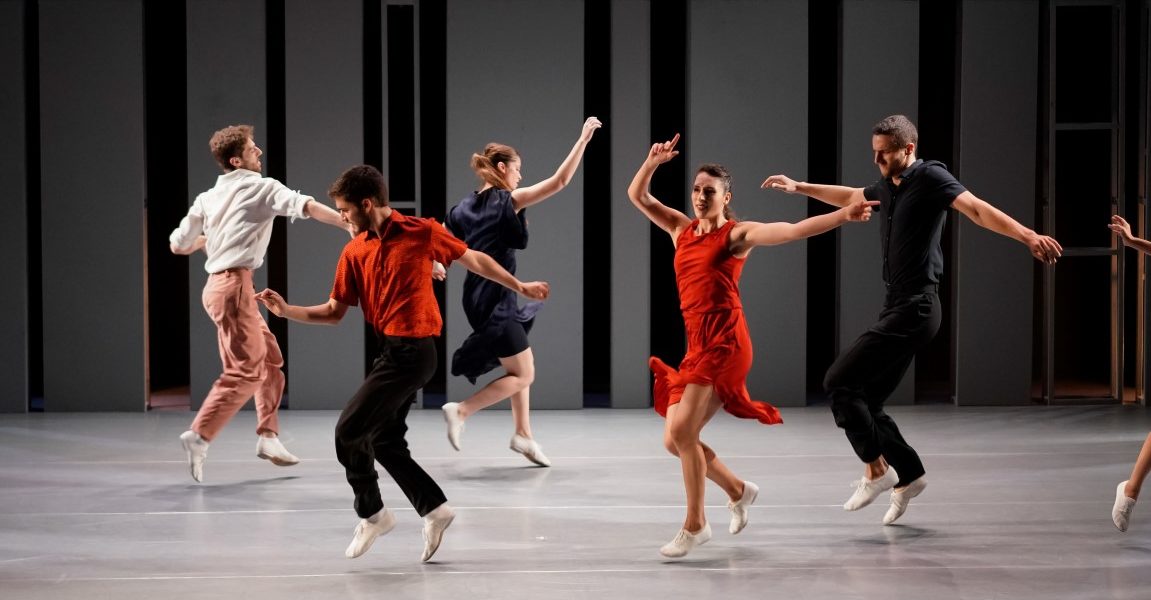Reflections on Lechet by Mor Shani for Inbal Dance Theater

photo by Efrat Mazor
A good friend and gifted choreographer once told me that sometimes, on her way to the bathroom in the middle of the night, she looks down and thinks to herself that she’s dressed for a contemporary dance piece. Underwear and a big t-shirt have become a staple on the Israeli dance stage, allowing audiences a type of up-close and personal glance at the dancers, as if they were joining them in their home spaces.
This is one reason that, at first glance, Lechet, the third work in the trilogy Three Suggestions for Coping with Time by Mor Shani for Inbal Dance Theater, looks old-fashioned. The dancers are not just dressed, they are dressed up. We aren’t walking in on them casually getting dressed in the morning in their apartments rather we are meeting them at a public event that they have prepared for, done their hair and makeup for, perhaps even put on perfume for and that event is the performance. They’ve even put on shoes. This detail, though seemingly superficial, sets the atmosphere as charged, special and celebratory. It harks back to the most glamorous musical theater moments delivered by Bob Fosse and Jerome Robbins.
The choreography picks up on that elegant energy and amplifies is, catapulting it out of a sleepy comfort zone into a super highway of smartly crafted compositions. Over the course of an hour, the dancers fly across the stage, passing one another at dizzying velocities to the sounds of techno music infused with oriental samples. The speed of the piece is striking. Were Lechet competing in a track race at the Olympics, it would grab the gold.
However, if we could watch Lechet in slow motion, we would see that it is actually anything but old-fashioned. It is a piece that is classically staged but progressively made. An old-fashioned piece would keep the dancers locked in their traditional gendered roles but Lechet breaks with those well-worn norms. There are duets between women and women, men and men all with a palpable flirtatious energy that permeates the stage.
Through repetitive phrases, done countless times in different interpretations, Lechet splays out the intensity of life. When the piece came to a close, I wondered how the dancers would get home as Lechet demands every ounce of energy they have, every breath and every heartbeat. And yet, within this extreme effort, the dancers appear to be truly enjoying themselves. They have found a freedom within the grind and that revelation is uplifting not only as a dance-lover but as a person who runs my own rat race day in and day out.
In many ways, this trilogy by Shani has put Inbal Dance Theater on the map as a relevant and important creative force in the Israeli dance scene. The choreography is interesting and updated, the dancers skilled and the overall impact impressive. It affords the audience a rare opportunity to luxuriate in movement.
If I was forced to give one dab of critique, it would be that Lechet falls victim to a familiar choreographic trap. The piece ends five minutes after its own, internal, perfect ending. There is a moment in which dancer Noam Deutsch stands awash in blue light, gasping for air, possibly in shock by what she and her cast members have just accomplished. They join her slowly, equally short of breath and, for a brief moment, we see the toll this piece has taken on their bodies. Had the lights gone to black at that very moment, it would have been a truly thrilling exit.
*Inbal Dance Theater dancers: Eshed Weissman, Jonathan Sha’al, Noam Deutsch, Ziv Besor, Shahar Brener, Or Saadi, Itay Meir, Amit Zaretsky
